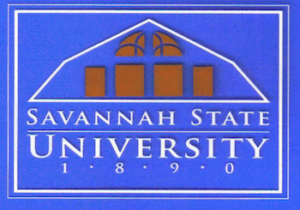
*On August 30, 1890, Savannah State University was founded. They are a public Historically Black University (HBCU) in Savannah, Georgia. It is the oldest public historically black university in the state.
The university is a member school of the Thurgood Marshall College Fund. Savannah State operates three colleges (College of Business Administration, College of Liberal Arts and Social Sciences, and College of Sciences and Technology) and the Office of Graduate Studies and Sponsored Research (OGSSR). It also participates in research centers and programs at the Center for Teaching, Learning, and Academic Support. They also have the Savannah Entrepreneurial Center; the Midtown Project; the Georgia Institute of Technology Regional Engineering Program (GTREP); and "A Collaboration to Integrate Research and Education in Marine and Environmental Science and Biotechnology" with the Skidaway Institute of Oceanography.
Part of the University of Georgia. Savannah State University was founded due to the Second Morrill Land Grant Act. The act mandated that southern and border states develop land grant colleges for black students, as their systems were segregated. On November 26, 1890, the Georgia General Assembly passed legislation creating the Georgia State Industrial College for Colored Youth. A preliminary school session was held in the Baxter Street School Building in Athens, where Richard R. Wright Sr. was the principal. The college operated in Athens for several months in 1891 before moving to its permanent location in Savannah on October 7, 1891, with Wright as the first president. The school had five faculty members. Its eight students were all graduates of Edmund Asa Ware High School, the first public high school for Blacks in Augusta.
The college awarded its first baccalaureate degree in 1898. In 1921 the first female students were admitted as residents on the campus. In 1928 the college became a full four-year degree-granting institution and ended the high school and normal school programs. Normal schools had been created in the 19th century in many state systems in the United States, after the German model, to educate teachers for elementary school students. With the expansion of towns across the US and continuing issues trying to educate four million freed blacks and their descendants, there was an urgent need to establish many new schools and train teachers in the North and the South quickly. States used normal schools to train teachers for primary school grades and sometimes secondary school. Normal schools or colleges tended to have two or three-year programs.
Gradually the normal schools were converted to full colleges with four-year curricula or were left behind. In 1932 the college became a full-member institution of the University System of Georgia, and its name was changed to Georgia State College. The college served as Georgia's land-grant institution for African-American students until 1947. The designation was then transferred to Fort Valley State College. In January 1950, the college changed its name to Savannah State College. With the growth in its graduate and research programs, in 1996, the Board of Regents of the University System of Georgia elevated Savannah State College to the status of a state university, and the name was changed to Savannah State University.
Savannah State University is the first institution in Georgia to offer a homeland security degree program. It was the second institution in the University System of Georgia to offer wireless Internet connectivity to students throughout the campus. Students may choose from 23 accredited undergraduate baccalaureate and five graduate master's degree programs offered through the university's colleges. The university has developed new partnerships that expand the range of programs and resources for students.
Taking advantage of its location on the coast, the university's Marine Biology Department operates two research vessels: The R/V Sea Otter (a 35 ft (11 m) twin diesel vessel owned by NOAA) and the R/V Tiger (a 22 ft (6.7 m) outboard workboat). In the fall of 2007, Savannah State teamed with the U.S. Army Corps of Engineers to offer a new course in environmental regulations so that students can deepen their understanding of policy and implementation issues. The program also helps them learn about specific environmental topics. Savannah State established an honors program for qualified, high-achieving, ambitious undergraduate students.